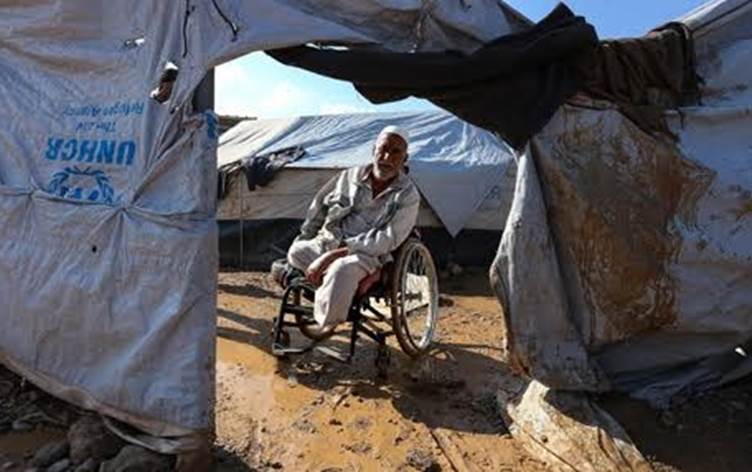BAHRAKA CAMP, Kurdistan Region – Ahmed Mukhtar sits tired and in despair in his wheelchair inside the tent that is his home at a camp in Kurdistan, as he watches fellow refugees who are in their sixties -- just like him – out of their tents and enjoying the sun.
Legs cut off due to advanced diabetes and diagnosed with a heart problem that is making his bad health worse, he says there is nothing to live for. All he wants until death is just some peace and comfort. But that is a distant dream inside a refugee camp.
“I am too old to be hopeful,” says Mukhtar, who escaped the Islamic State (ISIS) that now controls Qarqash, his village in Mosul province.
Mukhtar, who is from the Kurdish minority Shabak community, left home with his family and grandchildren almost 18 months ago, arriving to the safety of Bahraka and the refugee camp, about 30 kilometers outside Erbil.
The Kurdistan Region is hosting some 1.4 million internally displaced persons (IDPs), plus 600,000 Syrian refugees, most of them living in refugee camps.
According to data by the Reach institute about a year ago, 12 percent of families inside the Bahraka camp reported having a member with mental or physical disabilities.
Ali Ahmad, 29, is Mukhtar’s youngest son. He is a father of four and also living in the camp, spending his days and nights taking care of his ailing father.
“We can’t find every medicine he needs at the camp’s clinic, so we have to buy them, which is very expensive,” said Ahmad, who explained he earns about $15 a day working at a construction site in Erbil.
“My job is often temporary and it happens sometimes that I am jobless for months. This makes things very difficult for us,” Ahmad explained.
When out of money, Mukhtar’s family has no choice but to sell the oil or other provisions, provided to refugees by the Kurdistan government or NGOs, to buy the medicines needed to keep his father alive.
“we sell oil or food to the other refugees inside the camp,” he explained.
Another challenge for Mukhtar’s family is how to take him around the camp, where a heap of broken wheelchairs testify to the difficulty of getting wheels to move on broken and rocky paths and roads. In a medical emergency when they have to take him out of camp, things become really impossible.
“We have an old car but authorities will not let us park it inside the camp, so it is really difficult to get my father to the main gate where the car is,” said Ahmad.
The head of the camp, Ahmad Adeo, said that camp authorities do not know how many disabled live inside the camp, and that there are no plans for facilities specially geared to disabled refugees.
“There are no special services for physically disabled IDPs,” Adeo said, explaining that families with disabled members are housed in cabins or caravans, but admitted there are not enough for everyone in need.
Mukhtar’s family does not have one, and lives in a tent.
At the start of this year 2015 UN agencies provided some caravans to house refugees around Erbil. It said it would like to replace all tents with caravants, but had difficulties with funding.
“I have seen lots of misery, war and conflict in my lifetime,” said Mukhtar. “But the last thing I wanted was to spend the final years of my life homeless and in pain.”



Comments
Rudaw moderates all comments submitted on our website. We welcome comments which are relevant to the article and encourage further discussion about the issues that matter to you. We also welcome constructive criticism about Rudaw.
To be approved for publication, however, your comments must meet our community guidelines.
We will not tolerate the following: profanity, threats, personal attacks, vulgarity, abuse (such as sexism, racism, homophobia or xenophobia), or commercial or personal promotion.
Comments that do not meet our guidelines will be rejected. Comments are not edited – they are either approved or rejected.
Post a comment